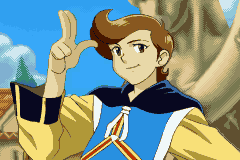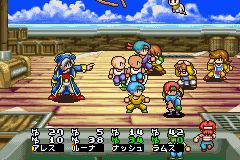|
|

|
BATTLE SYSTEM
|

|
INTERACTION
|

|
ORIGINALITY
|

|
STORY
|

|
MUSIC & SOUND
|

|
VISUALS
|

|
CHALLENGE
|
Pretty pathetic
|
COMPLETION TIME
|
17-24 hours
|
|
OVERALL
2.5/5
|
Rating definitions
|
|
|
The Game Boy Advance has been granted a fine software library during its existence. Originals, ports, action RPGs, Tactical RPGs, and more – it has no paucity of worthwhile plays. This surplus of worthwhile content makes it all the odder that Lunar, a game never associated with cartridges in the past, would make its way to a system already full of goodness. Lunar Legend proves to evade a distinction of ‘terrible,’ but certain alterations necessary for the cartridge format seem unfortunately detrimental to the overall experience.
The groundwork for Lunar Legend was done almost 10 years before the title was actually released, in the form of Lunar: The Silver Star on Sega CD. The central story is roughly the same here, although numerous alterations and additions have been made. We still have Alex, Luna and Ramus setting off on a quest to obtain a valuable gem from the White Dragon Quark at the behest of Nash, an apprentice magician who wishes to become a DragonMaster, which cannot be accomplished without the favor of all four Dragons. After the gem is acquired (while Nash is somewhat disappointed), Ramus determines that the small island upon which Burg is located cannot handle the monetary redistribution he wishes to actuate, leading to the trio’s departure to the mainland. The differences already apparent from the Sega CD version are the early appearance of Nash and the departure of Luna to the mainland. There are numerous other moderate changes to behold, but the general framework holds up recognizably.
 Sadly, Nash’s attempt to revive the pompadour style was undone by his inability to play the guitar.
Sadly, Nash’s attempt to revive the pompadour style was undone by his inability to play the guitar.
|
|
Lunar Legend’s battle system ditches the somewhat grid-based approach of its preceding iterations in favor of a fairly standard turn-based affair. Spells affect either rows or columns of enemies far more often than they affect everything, and there is a special skill unique to each character which can only be used after a certain number of enemies has attacked the character to charge up the bar for using these skills, but otherwise convention is followed. The battle system gets boring quickly, as random battles tend to occur more frequently than desired for rewards that do not suffice as compensation.
Challenge-wise, Lunar Legend bears the surprising distinction of being even easier than its Sega CD forbear. The final battle is a cinch once a certain spell is recognized as being necessary, and all other battles pose no more than a miniscule threat to the player. There are a few ancillary areas that open up and close again as the game progresses, but nothing in the overarching story to invite replay. Unless one is greatly enamored with the card collection – all enemy types have a card associated with them, which may or may not be dropped post-battle. Characters also have cards, with the main cast having multiples each. If one cares to grab a GBA link cable and has a friend with the game, these cards can be traded. Why one would bother is an open question however, since the cards are present solely to be looked at.
Interaction at least represents a clear step past the annoyance of its forbear. Items are in a group collection rather than given to each character in miniscule amounts with Nall storing the balance. Menus otherwise conform to the standard usage RPGamers ought to be familiarized with. Originality in a title that is the fourth version of the same story will not be discussed.
 If Alex & co. were ninjas, perhaps the eternal Ninja vs. Pirate war could at last be settled. Alas, it is not to be.
If Alex & co. were ninjas, perhaps the eternal Ninja vs. Pirate war could at last be settled. Alas, it is not to be.
|
|
Visuals are pretty good. Animation in battle is fluid, and spell effects look fine. Enemies that actually moved in past renditions of this title are now bound in place according to the strictures of turn-based fighting, unfortunately. They are not frozen a la Final Fantasy I-VI, but their having to stay in one place when they were once able to run about the entire screen is disheartening. As the GBA cannot handle full motion video, portions of the story that would have been told with that format in earlier iterations are now granted animation cells. These look good and are viewable after completion of the game, though if one has played an earlier edition of the game a lack may be felt here. Otherwise the graphics look about the same as they always have, since Lunar has never been at the technological forefront.
Aurally something was lost in the transition. The music is not necessarily BAD, just bland. Noriyuke Iwadare’s score on the Sega CD was not his best, but had a fair share of memorable music. Lunar Legend lacks much music that will be memorable. Some tracks have antecedents in the compositions of old, but sound worse now. New ones are just forgettable. And the sound quality is not quite as high as it could be. Voice acting, which clearly could not attain the same precedence it did in earlier versions of Lunar, has been dispensed with entirely.
Lunar Legend manages the interesting trick of taking nearly the same amount of time to complete as its original version did. The game does move along quickly, and the result of this is a title that should take no more than an absolute maximum of 25 hours to complete – quicker players can probably do it in under 20 hours. Without an incentive for replay (unless the card system mentioned above excites one), this is probably the total time to be invested.
Lunar Legend could have been more successful if this was not the fourth reworking of the same overall framework. While its story is still fulfilling, the combat has become a chore to plow through. The compromises to the established storytelling method of Lunar are also jarring to a player experienced with one of its earlier formats. It is still not a total loss, but achieves the dubious status of at-best mediocre. With results like this, it is possibly for the best that Lunar 2 was not granted a GBA remake.
Review Archives
|









